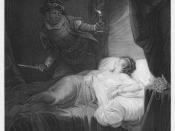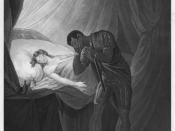A tragic hero is the main character in a play that takes a downfall or is ruined during the play. The tragic hero in this play is Othello, who is undoubtedly ruined in the course of this drama. Othello is very characteristic of a tragic hero. Othello is a man that shows much greatness throughout the play, as well as weaknesses. One of these weaknesses that Othello has is blindness to reality.
Throughout his adult life he has been acclaimed for his many conquests throughout the land. He also shows greatness through his love for Desdemona.
But that I love the gentle Desdemona,
I would not my unhoused free condition
Put into circumscription and confine
For the seas' worth. (A1S2 lines 25-28)
Othello is of strong character. He is very proud and in control of his every move throughout the play. The control is not only of power but also of the sense of his being who he is, a great warrior.
In Act One, Othello has an unpleasant encounter with Brabantio, regarding his elopement with Brabantio's daughter, Desdemona. However, before anything could happen, Othello said:
Hold your hands, both of you of my inclining and the rest.
Were it my cue to fight, I should have known it
Without a prompter. (A1S2 lines 81-83)
The power he shows here is quite astounding. Another dimension of Othello's strong nature is shown when Iago warns him of Brabantio's anger. Iago tries to persuade Othello to flee before Brabantio finds him. Othello's replies to Iago's persuasion shows the strength he has. He has confidence in himself and is calm.
My services, which I have done the signory,
Shall out-tongue his complaints (A1S2 lines 18-19)
Not I: I must be found
My parts, my title, and my...


